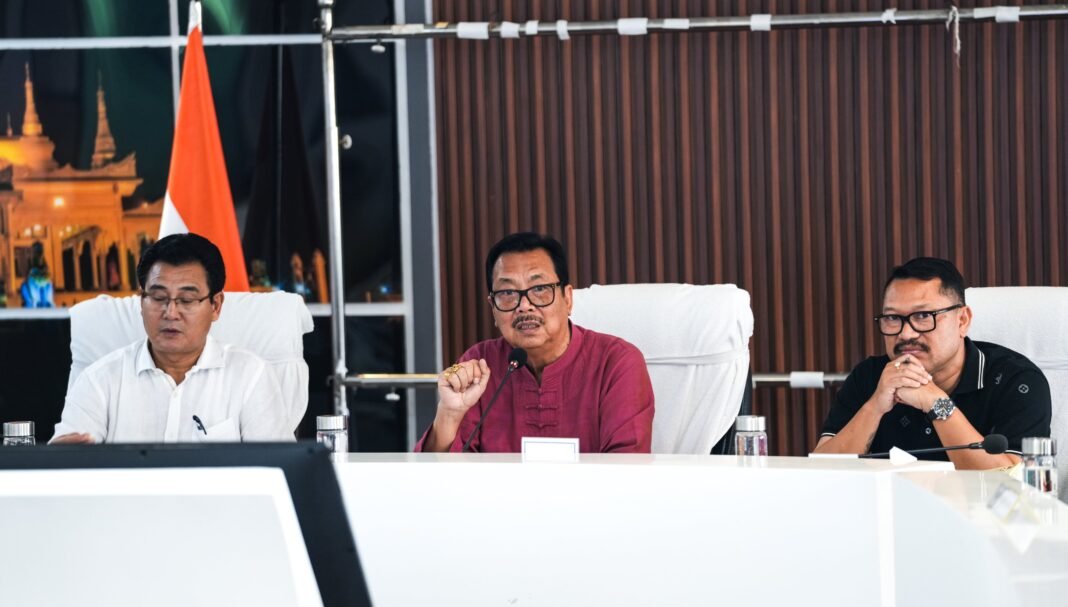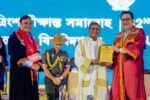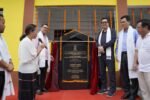HT Bureau
NAMSAI, July 4: In a significant push toward cultural preservation and sustainable development, Deputy Chief Minister Chowna Mein chaired a comprehensive district-level development meeting at the Deputy Commissioner’s Conference Hall in the Mini Secretariat, Namsai.
The meeting, which included key officials and community leaders, focused on language preservation, environmental conservation, and social reform measures.
According to an official statement, a major outcome of the meeting was the finalisation of an action plan for the introduction of the Tai Khamti language as a third language across all government and private schools, as well as Buddha Viharas in the district.
The language will be taught from the primary to secondary level, beginning August 16, 2025.
Emphasising the cultural importance of the move, Mein said, “The loss of a language often leads to the erosion of rituals, traditions, and cultural identity. Preserving the Tai Khamti language is essential to maintaining the community’s rich heritage.”
The Deputy Chief Minister directed the Deputy Commissioner to ensure the seamless implementation of the policy across private educational institutions.
The Tai Khamti Heritage & Literary Society (TKHLS) has been entrusted with the responsibility of printing primers for primary school students and conducting training sessions for teachers in the local language.
Furthering the state’s environmental agenda, the meeting resolved to observe Nadi Utsav on July 8.
As part of the observance, fish fingerlings will be released into rivers and streams to restore aquatic ecosystems and replenish local fish populations.
Another initiative, titled Ek Ped Maa Ke Naam, will be launched to encourage widespread tree plantation in government offices, public spaces, village areas, and roadsides.
The campaign aims to instill environmental consciousness while contributing to ecological restoration.
To reinforce cleanliness and public hygiene, the administration will adopt one village per constituency under the Cleanliest Village model programme.
This initiative will promote sanitation best practices, waste management systems, and community-driven efforts in creating healthier living environments.
Addressing concerns over the rise in drug-related issues, Mein directed authorities to initiate strict preventive and corrective actions in collaboration with community-based organisations (CBOs).
The district administration also announced plans to deploy flying squads to monitor and curb illegal hunting and fishing activities, particularly during night hours, to safeguard biodiversity and wildlife habitats.
The meeting also took stock of the progress of the ongoing Borbeel Lake Restoration Project.
Mein emphasised the need for timely execution and sustainable planning to ensure long-term ecological stability in the region.
The meeting was attended by Namsai MLA Chau Zingnu Namchoom, Deputy Commissioner C.R. Khampa, ZPC Urmila Mancheykun, ZPM Chongkham, ADCs of Chongkham and Wakro, heads of departments, community leaders, Buddhist monks from Namsai, Kherem, and the Golden Pagoda, and members of various organisations including the Tai Khamti Development Society (TKDS), Tai Khamti Singpho Council (TKSC), Tai Khamti Heritage & Literary Society (TKHLS), and the All Tai Khamti Singpho Students’ Union (ATKSSU).
The initiatives reflect a coordinated strategy toward cultural revival, grassroots development, and ecological resilience, aligning with the government’s broader goals of inclusive growth and heritage conservation in Arunachal Pradesh.












